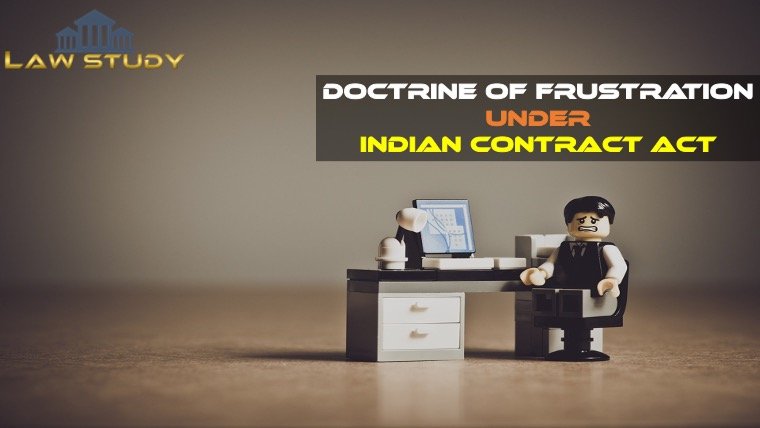Introduction of the Doctrine of Frustration: – When parties enter into contracts, it creates a contractual duty and responsibility on them to perform the contract. However, contract fulfillment is frequently rendered impossible due to unpredicted events. The contract is considered to be frustrating in such instances.
In this article, we covered the notion of frustration under the Indian Contract Act, as well as the reasons for contract frustration & the impact of frustration.
Doctrine of frustration
The fundamental principle of contracts provides that the parties to the contract must perform their contractual responsibilities, and in the event of a violation, the party violating the contract must compensate the other for the damages caused. The frustration doctrine is an exception to the general principle.
The doctrine of frustration essentially discusses the uncertainty of contract performance. It signifies that a contract can’t be carried out due to a circumstance beyond the parties’ control. The execution of such a contract becomes frustrated, that is, it becomes difficult, unfeasible, or even unlawful. Contracts can be broken due to unforeseeable, impossible occurrences or events which is beyond the parties’ control.
The Theory of Frustration
Under the Indian Contract Act, the theory of Frustration
The phrase “Frustration of Contract” is not defined under the Indian Contract Act of 1872. Sec. 56 of the Act, on the other hand, enshrines the theory of frustration and declares that a contract to perform an impossible act is null and invalid. Furthermore, it adds that when a contract to do an act becomes unfeasible or unlawful due to an incident that the promisor can’t actually prevent, the entire contract becomes unlawful.
Syed Khursheed Ali vs. the State of Orissa
In this aspect, the Court decided that the doctrine u/s 56 is invoked in the case of a subsequent unforeseeable incident for which neither party is liable.
Conditions required to demonstrate frustration of contract
The contract can be proven to be frustrated if the following requirements are met:
- The existence of a legally binding contract;
- The contract has not yet been fulfilled;
- The contract’s performance has become unfeasible;
- The impossibility arose as a result of an unforeseeable incident for both parties.
Reasons for the Doctrine of Frustration
The aforementioned are the causes for the frustration of the contract:
Performance impossibility
The doctrine of frustration arises from the inability to complete a task. However, the principle is not restricted to physical impossibilities.
Satyabrata Ghose vs. Mugneeram Bangurn & Co & Anr
It was determined that the phrase “impossible” in sec. 56 of the Contract Act wasn’t used in the context of physical or actual impossibility. It is not important for the performance of an act to be actually impossible, but it may be unfeasible, and if an occurrence completely affects the basic foundation of the contract, it can be claimed that the promisor deems it impossible to do the act that he agreed to do. As a result, when we state that the contract’s object has been lost, we mean that the contract has been frustrated.
Destruction of the subject matter
The notion of frustration occurs when the contract’s subject matter is destroyed.
Taylor vs. Caldwell
This was further stated in the landmark case of Taylor vs. Caldwell, in which Taylor agreed to perform at a concert, but the venue where the event was to take place burned down on the day of the occasion. The destruction of the hall represents the impossibility of completing the contract. This demonstrates that the destruction of the contract’s subject matter instantly renders the contract frustrated
A party’s death or Incapacity
If the contract requires the parties to perform personally, the death or disability of one of the parties renders the contract frustrated because the contract can no longer be performed.
Frustration caused by legal or govt. Intervention
When legislation is enacted after the establishment of a contract, making the performance of the contract impossible, then the contract becomes void & frustrated. The frustration of the Contract is a result of unforeseen events.
This scenario arises where there’s no physical incapacity of contract execution, but the principal purpose for which the contract was made is defeated due to a change in circumstances. The contract is avoided as a result of the changed circumstances, and the parties are relieved of their contractual obligations.
War Intervention
The war intervention makes contract performance impossible, declaring the contract void.
Effect & consequences of the Frustration Doctrine
The contract is inherently void & frustrated
The primary concept is that if a problematic circumstance occurs, the contract is immediately terminated. The parties are not obliged to terminate the contract because the parties’ responsibilities are instantly terminated once the contract becomes frustrated.
Further liabilities are discharged
After the contract is considered to be frustrating, both parties are released from any further duties.
Accrued obligations
The legal responsibilities or rights that had already accrued prior to the frustrating occurrence are unaffected.
Conclusion
When an unforeseeable incident occurs that makes contract execution unfeasible, the doctrine of frustration comes into effect. The contract becomes void when it is frustrating, and the parties are released from any obligations as a result.
This idea is an exception to the general contract principles that govern when compensation is generally granted for contract breach. However, when the doctrine of frustration is applied, there is no mistake on the side of the parties, and so the party must not be forced to compensate in such a circumstance.

























